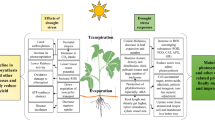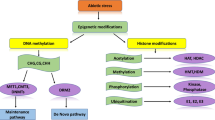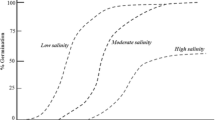Abstract
The mode of growth and development of plants does not allow them to change their habitat upon stress imposition. Through the course of evolution, plants have acquired complex molecular pathways to deal with abiotic and biotic factors to ensure their survival. The changing climatic conditions have led to unprecedented weather patterns resulting in increased crop losses. Similarly, the spread of pathogens in an era of increasing international trade has resulted in introduction and adaptation of these pathogens to new areas and cause frequent epidemics. There is an increasing need to understand the molecular mechanisms underlying stress responses in plants and envision ways to develop new crop varieties with improved features.
Similar content being viewed by others
Abbreviations
- ROS:
-
Reactive oxygen species
- NO:
-
Nitric oxide
- PTMs:
-
Post-translational modifications
- HATs:
-
Histone acetylases
- HDACs:
-
Histone deacetylases
- miRNAs:
-
MicroRNAs
- siRNAs:
-
Small interfering RNAs
- lncRNAs:
-
Long non-coding RNAs
References
Axtell MJ (2013) Classification and comparison of small RNAs from plants. Annu Rev Plant Biol 64:137–159
Friso G, van Wijk KJ (2015) Posttranslational protein modifications in plant metabolism. Plant Physiol 169:1469–1487
Jha UC, Nayyar H, Jha R, Khurshid M, Zhou M, Mantri N, Siddique KHM (2020) Long non-coding RNAs: Emerging players regulating plant abiotic stress response and adaptation. BMC Plant Biol 20:466
Kim JM, Sasaki T, Ueda M, Sako K, Seki M (2015) Chromatin changes in response to drought, salinity, heat, and cold stresses in plants. Front Plant Sci 6:114
Kumar V, Thakur J, kuma, Prasad M, (2021) Histone acetylation dynamics regulating plant development and stress responses. Cell Mol Life Sci 78:4467–4486
McKenna TP, Koziol L, Bever JD, Crews TE, Sikes BA (2020) Abiotic and biotic context dependency of perennial crop yield. PLoS ONE 15:e0234546
Morris WF, Ehrlén J, Dahlgren JP, Loomis AK, Louthan AM (2020) Biotic and anthropogenic forces rival climatic/abiotic factors in determining global plant population growth and fitness. Proc Natl Acad Sci 117:1107–1112
Pandey P, Irulappan V, Bagavathiannan MV, Senthil-Kumar M (2017) Impact of combined abiotic and biotic stresses on plant growth and avenues for crop improvement by exploiting physio-morphological traits. Front Plant Sci 8:537. https://doi.org/10.3389/fpls.2017.00537
Pikaard CS, Scheid OM (2014) Epigenetic Regulation in Plants. Cold Spring Harb Perspect Biol 6:a019315
Prasad A, Prasad M (2021) Host-virus interactions mediated by long non-coding RNAs. Virus Res 298:198402
Prasad A, Sharma N, Hari-Gowthem G, Muthamilarasan M, Prasad M (2020) Tomato yellow leaf curl virus: impact, challenges, and management. Trends Plant Sci 25:897–911
Prasad A, Sharma N, Muthamilarasan M, Rana S, Prasad M (2019) Recent advances in small RNA mediated plant-virus interactions. Crit Rev Biotechnol 39:587–601
Rai MI, Alam M, Lightfoot DA, Gurha P, Afzal AJ (2019) Classification and experimental identification of plant long non-coding RNAs. Genomics 111:997–1005
Sharma S, Prasad A, Sharma N, Prasad M (2021) Role of ubiquitination enzymes in abiotic environmental interactions with plants. Int J Biol Macromol 181:494–507
Singh RK, Prasad A, Muthamilarasan M, Parida SK, Prasad M (2020) Breeding and biotechnological interventions for trait improvement: status and prospects. Planta 252:54
Singh RK, Prasad M (2021) Delineating the epigenetic regulation of heat and drought response in plants. Crit Rev Biotechnol. https://doi.org/10.1080/07388551.2021.1946004
Wang XB, Wu Q, Ito T, Cillo F, Li WX, Chen X, Yu JL, Ding SW (2010) RNAi-mediated viral immunity requires amplification of virus-derived siRNAs in Arabidopsis thaliana. Proc Natl Acad Sci 107:484–489
Zhang H, Zhu J, Gong Z, Zhu JK (2021) Abiotic stress responses in plants. Nat Rev Genet. https://doi.org/10.1038/s41576-021-00413-0
Acknowledgements
Authors acknowledge DBT-eLibrary Consortium (DeLCON) for providing access to e-resources.
Author information
Authors and Affiliations
Corresponding author
Ethics declarations
Conflict of interest
The authors have no conflict of interest to declare.
Additional information
Publisher's Note
Springer Nature remains neutral with regard to jurisdictional claims in published maps and institutional affiliations.
Rights and permissions
About this article
Cite this article
Prasad, A., Senthil-Kumar, M. & Prasad, M. Complex molecular mechanisms determine fitness of plants to biotic and abiotic stresses. J. Plant Biochem. Biotechnol. 30, 633–635 (2021). https://doi.org/10.1007/s13562-021-00751-4
Received:
Accepted:
Published:
Issue Date:
DOI: https://doi.org/10.1007/s13562-021-00751-4




